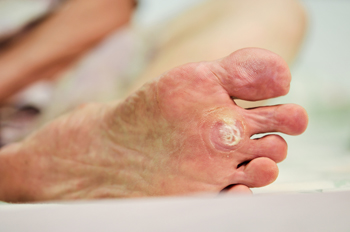
Plantar warts are noncancerous growths caused by the human papillomavirus, or HPV, infecting the outer layer of skin on the soles of the feet. They often appear as small, grainy lesions with black dots embedded within them, causing discomfort or pain, especially when walking or standing. Those individuals with diabetes or compromised immune systems should be particularly watchful of such growths. These warts are contagious and can spread through direct contact with infected surfaces or skin. Treatment options can include salicylic acid to prescription strength treatments such as cryotherapy, laser therapy, or surgical removal. If you have a plantar wart that causes persistent pain, changes in appearance, or interferes with walking, it is suggested that you seek podiatric attention.
Plantar warts can be very uncomfortable. If you need your feet checked, contact Patrick Bruton, DPM from Big Country foot and Ankle. Our doctor will assist you with all of your foot and ankle needs.
About Plantar Warts
Plantar warts are the result of HPV, or human papillomavirus, getting into open wounds on the feet. They are mostly found on the heels or balls of the feet.
While plantar warts are generally harmless, those experiencing excessive pain or those suffering from diabetes or a compromised immune system require immediate medical care. Plantar warts are easily diagnosed, usually through scraping off a bit of rough skin or by getting a biopsy.
Symptoms
- Lesions on the bottom of your feet, usually rough and grainy
- Hard or thick callused spots
- Wart seeds, which are small clotted blood vessels that look like little black spots
- Pain, discomfort, or tenderness of your feet when walking or standing
Treatment
- Freezing
- Electric tool removal
- Laser Treatment
- Topical Creams (prescription only)
- Over-the-counter medications
To help prevent developing plantar warts, avoid walking barefoot over abrasive surfaces that can cause cuts or wounds for HPV to get into. Avoiding direct contact with other warts, as well as not picking or rubbing existing warts, can help prevent the further spread of plantar warts. However, if you think you have developed plantar warts, speak to your podiatrist. He or she can diagnose the warts on your feet and recommend the appropriate treatment options.
If you have any questions please feel free to contact our offices located in Abilene, and Brownwood, TX . We offer the newest diagnostic and treatment technologies for all your foot and ankle needs.
